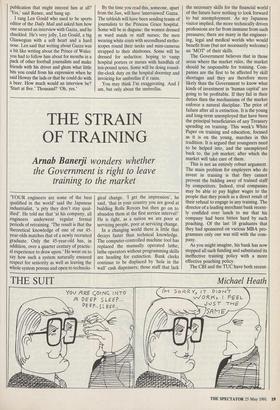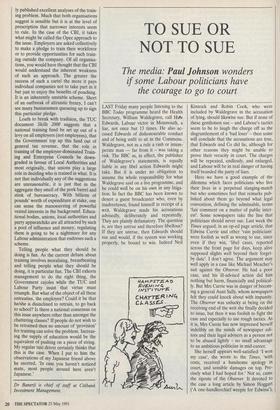THE STRAIN OF TRAINING
Arnab Banerji wonders whether
the Government is right to leave training to the market
`YOUR engineers are some of the best qualified in the world' said the Japanese industrialist, `a pity they don't stay qual- ified'. He told me that `at his company, all engineers underwent regular formal periods of retraining. `The result is that the theoretical knowledge of one of our 45- year-olds matches that of a newly recruited graduate. Only the 45-year-old has, in addition, over a quarter century of practic- al experience to draw upon.' He went on to say how such a system naturally ensured respect for seniority as well as leaving the whole system porous and open to technolo- gical change. `I get the impression', he said, `that in your country you are good at building Rolls Royces but then go on to abandon them at the first service interval!' He is right, as a nation we are poor at servicing people, poor at servicing change. In a changing world there is little that decays faster than technical knowledge. The computer-controlled machine tool has replaced the manually operated lathe; lathe operators without programming skills are heading for extinction. Bank clerks continue to be displaced by `hole in the wall' cash dispensers; those staff that lack the necessary skills for the financial world of the future have nothing to look forward to but unemployment. As my Japanese visitor implied, the more technically driven professions are far from immune from such pressures; there are many in the engineer- ing, legal and medical worlds who would benefit from (but not necessarily welcome) an `MOT' of their skills.
The Government believes that in those areas where the market rules, the market should be responsible for training. Com- panies are the first to be affected by skill shortages and they are therefore more likely than the Government to know what kinds of investment in `human capital' are going to be profitable. If they fail in their duties then the mechanisms of the market enforce a natural discipline. The price of failure after all is extinction. It is the young and long-term unemployed that have been the principal beneficiaries of any Treasury spending on training. This week's White Paper on training and education, focused as it is on the young, marches in this tradition. It is argued that youngsters need to be helped into, and the unemployed back to, the job market; after which the market will take care of them.
This is not an entirely robust argument. The main problem for employers who do invest in training is that they cannot prevent the bidding away of trained staff by competitors. Indeed, rival companies may be able to pay higher wages to the people that they poach as a direct result of their refusal to engage in any training. The director of a leading merchant bank recent- ly confided over lunch to me that his company had been bitten hard by such poaching. Of the last 18 graduates that they had sponsored on various MBA pro- grammes only one was still with the com- pany.
As you might imagine, his bank has now stopped all such funding and substituted its ineffective training policy with a more effective poaching policy.
The CBI and the TUC have both recent- ly published excellent analyses of the train- ing problem. Much that both organisations suggest is sensible but it is at the level of prescription that narrower interests seem to rule. In the case of the CBI, it takes what might be called the Opec approach to the issue. Employers are asked collectively to make a pledge to train their workforce or to provide opportunities for such train- ing outside the company. Of all organisa- tions, you would have thought that the CBI would understand the inherent weakness of such an approach. The greater the success of such a cartel the more it pays individual companies not to take part in it but just to enjoy the benefits of poaching. It is an inherently unstable scheme. Short of an outbreak of altruistic frenzy, I can't see many businessmen queueing up to sign this particular pledge.
Loath to break with tradition, the TUC document Skills 2000 suggests that a national training fund be set up out of a levy on all employers (not employees), that the Government top up this fund out of general tax revenue, that the role in training of the employer-dominated Train- ing and Enterprise Councils be down- graded in favour of Local Authorities and most originally, that unions play a large role in deciding who is trained in what. It is not that individually any of the suggestions are unreasonable, it is just that in the aggregate they smell of the pork barrel and stink of bureaucracy. With billions of pounds' worth of expenditure at stake, one can sense the manoeuvring of powerful vested interests in the background. Educa- tional bodies, unions, local authorities and party apparatchiks are all attracted by such a pool of influence and money; regulating them is going to be a nightmare for any Labour administration that endorses such a scheme.
Telling people what they should be doing is fun. As the current debate about training involves moralising, breastbeating and telling people what they should be doing, it is particular fun. The CBI exhorts management to do the right thing, the Government cajoles while the TUC and Labour Party insist that virtue must triumph. But what of the object of all these entreaties, the employee? Could it be that he/she is disinclined to retrain, to go back to school? Is there a national consensus on this issue anywhere other than amongst the chattering classes? If people do not wish to be retrained then no amount of `provision' for training can solve the problem. Increas- ing the supply of education would be the equivalent of pushing on a piece of string. My regular taxi driver certainly thinks that this is the case. When I put to him the observations of my Japanese friend above he snorted, `In case you haven't noticed mate, most people around here aren't Japanese.'
Dr Banerji is chief of staff at Citibank Investment Management.



















































 Previous page
Previous page